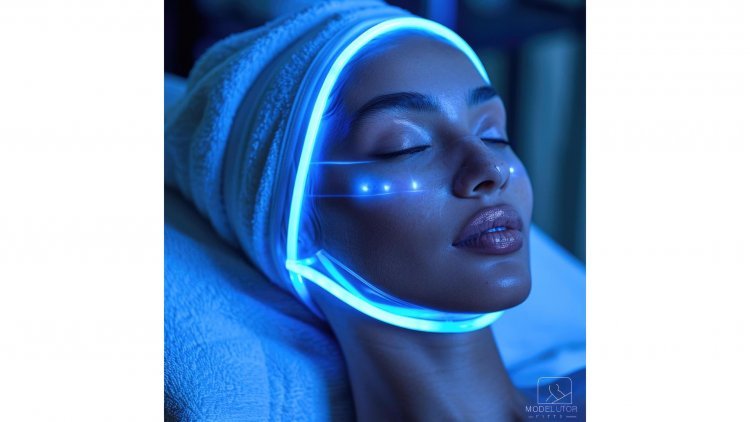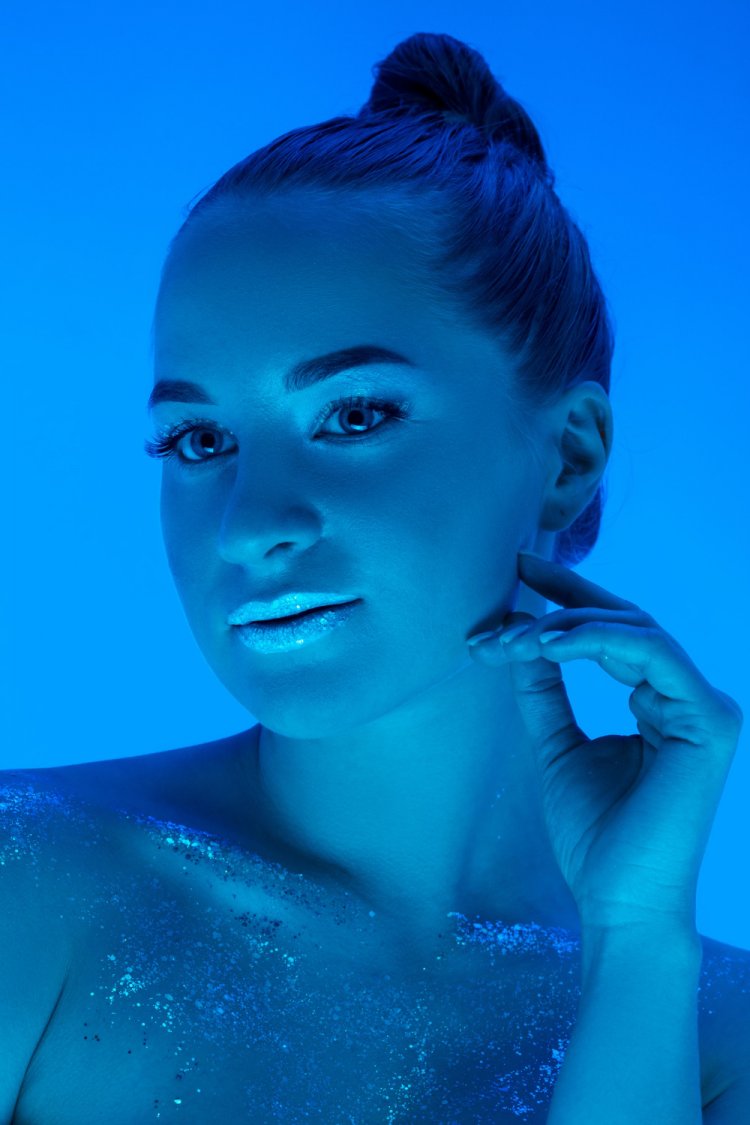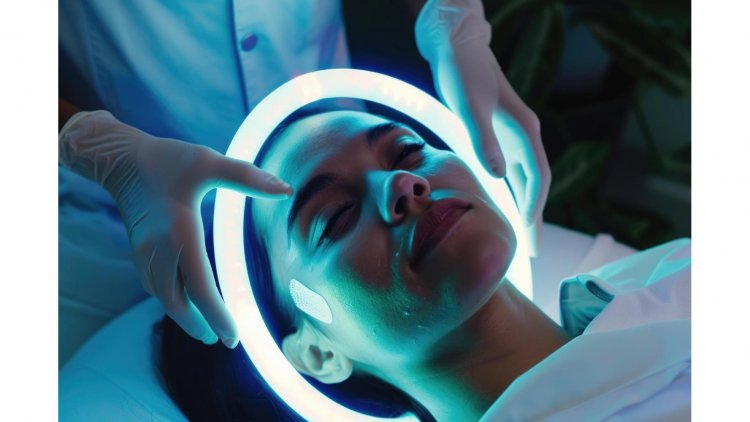The Unseen Glow: How Blue Light Alters Your Skin
In our hyper-connected digital world, blue light has become a staple of our daily lives. From the screens of our smartphones and laptops to LED lighting in our homes, blue light is everywhere. While its effects on our sleep patterns and eye health are well-documented, its impact on skin health is an emerging topic of significant interest. This article delves into how blue light influences our skin, exploring its potential benefits and drawbacks, and offers insights into how you can protect your skin from its effects.

The Science Behind Blue Light
Blue light is part of the visible light spectrum and has a short wavelength, which means it carries more energy compared to other types of light. It is emitted by various sources, including natural sunlight and artificial lighting such as LEDs and screens. The high energy of blue light allows it to penetrate deeper into the skin compared to other light wavelengths.
Blue Light and the Skin
Blue light reaches the skin’s dermal layers, where it can potentially have various effects. Unlike UV light, which is known for its harmful effects, blue light’s impact on the skin is less straightforward but equally significant. Research is beginning to uncover the ways in which blue light influences skin health, with some studies suggesting both positive and negative effects.

Potential Negative Effects of Blue Light on Skin
- Oxidative Stress and Free Radical Production
One of the primary concerns with blue light exposure is its potential to generate oxidative stress. Oxidative stress occurs when free radicals, which are highly reactive molecules, damage cells and tissues. Blue light exposure can lead to the production of these free radicals, which in turn may accelerate the aging process of the skin by breaking down collagen and elastin fibers. This can result in premature wrinkles, fine lines, and a loss of skin elasticity.
- Pigmentation and Hyperpigmentation
Prolonged exposure to blue light has been associated with the development of pigmentation issues. While UV rays are notorious for causing sunspots and hyperpigmentation, blue light can also contribute to these conditions. Blue light can stimulate melanin production in the skin, which can lead to uneven skin tone and dark spots over time.
- Inflammation and Skin Sensitivity
Blue light exposure may exacerbate inflammation in the skin, leading to increased sensitivity and redness. For individuals with pre-existing skin conditions like rosacea or eczema, blue light could potentially worsen these conditions, causing flare-ups and discomfort.
- Disruption of Skin Barrier Function
The skin barrier is crucial for maintaining hydration and protecting the skin from environmental aggressors. Some research suggests that blue light can compromise the skin barrier function, making it more susceptible to dehydration and external irritants. This disruption can lead to a range of skin issues, including dryness and increased sensitivity.
The Bright Side: Potential Benefits of Blue Light
While blue light is often discussed in the context of its negative effects, it is not without its potential benefits. Blue light therapy is used in various dermatological treatments due to its therapeutic properties.
- Acne Treatment
Blue light therapy has been shown to be effective in treating acne. It works by targeting the bacteria responsible for acne, Propionibacterium acnes. The blue light penetrates the skin and produces a reaction that helps to kill these bacteria, reducing inflammation and the number of acne lesions. This treatment is often used in conjunction with other therapies to enhance its effectiveness.
- Wound Healing
Some studies suggest that blue light can accelerate wound healing. The light has been found to stimulate cellular processes that enhance repair and regeneration, potentially improving the healing time for minor skin injuries. This therapeutic use of blue light is an area of ongoing research, with promising results.
- Skin Rejuvenation
Blue light therapy is sometimes used for skin rejuvenation. It is believed to stimulate collagen production and improve skin texture. This effect can contribute to a more youthful appearance by reducing the visibility of fine lines and improving overall skin tone.
Protecting Your Skin from Blue Light
Given the potential negative effects of blue light, it’s important to take steps to protect your skin. Here are some practical tips and strategies:
- Use Blue Light Blocking Products
Many skincare products are now formulated with ingredients that help shield the skin from blue light. Look for serums, moisturizers, and sunscreens that contain antioxidants like vitamin C, E, and niacinamide. These ingredients can neutralize free radicals and provide a protective barrier against blue light damage.
- Incorporate Antioxidants in Your Skincare Routine
Antioxidants play a crucial role in combating oxidative stress caused by blue light. Incorporate products with antioxidants into your skincare routine to help neutralize free radicals and reduce the impact of blue light. Ingredients such as green tea extract, resveratrol, and coenzyme Q10 can be particularly beneficial.
- Limit Screen Time
Reducing the amount of time you spend in front of screens can help minimize your blue light exposure. Try to take regular breaks from screens, follow the 20-20-20 rule (every 20 minutes, look at something 20 feet away for at least 20 seconds), and consider using screen filters or blue light glasses to reduce exposure.
- Maintain a Healthy Skincare Routine
A consistent skincare routine that includes cleansing, exfoliating, and moisturizing can help maintain your skin’s health and resilience. Regular exfoliation can remove dead skin cells and improve the efficacy of your skincare products, while moisturizing helps to strengthen the skin barrier and maintain hydration.
- Use Sunscreen Daily
Although blue light does not cause sunburn like UV rays, sunscreen is still essential. Sunscreen protects against UV radiation, which can exacerbate the effects of blue light on the skin. Opt for a broad-spectrum sunscreen with SPF 30 or higher to ensure comprehensive protection.
- Consider Blue Light Filtering Glasses
If you spend extended periods in front of screens, blue light filtering glasses can be an effective way to reduce your exposure. These glasses are designed to block a portion of blue light emitted by screens, potentially reducing its impact on your skin and eyes.

Balancing the Blue Light Equation: Navigating Risks and Rewards
In the modern world, where blue light is inescapable, understanding its effects on the skin is crucial. As research continues to evolve, it is essential to remain informed about both the potential benefits and risks associated with blue light exposure. While blue light can have positive effects like aiding in acne treatment and promoting wound healing, its potential to cause oxidative stress, pigmentation issues, and skin sensitivity cannot be overlooked.
Emerging Research and Future Directions
Ongoing research is crucial in understanding the full spectrum of blue light's impact on skin health. As science progresses, we may uncover more nuanced insights into how blue light affects our skin and develop more effective strategies to mitigate its negative effects.
1. Advances in Blue Light Research
Researchers are investigating various aspects of blue light exposure, including its interactions with different skin types and conditions. Emerging studies are exploring the long-term effects of blue light and its role in chronic skin diseases. This research will help refine our understanding and lead to more targeted skincare solutions.
2. Innovative Skincare Solutions
The skincare industry is responding to the growing concern about blue light with innovative products and treatments. Companies are developing advanced formulations with ingredients specifically designed to combat blue light damage. Additionally, new technologies in blue light protection are being explored, such as enhanced screen filters and blue light blocking materials.
3. Integrative Health Approaches
Integrative health approaches are gaining traction in addressing blue light exposure. These approaches combine skincare with lifestyle modifications to provide a holistic solution. For instance, incorporating dietary antioxidants and practicing good sleep hygiene can complement topical treatments and help mitigate the effects of blue light on the skin.
Practical Tips for Managing Blue Light Exposure
Managing blue light exposure involves both proactive skincare and lifestyle adjustments. Here are some actionable tips to help you balance your blue light exposure and maintain healthy skin:
1. Invest in Blue Light Screen Protectors
Screen protectors that filter blue light can be a valuable addition to your devices. These filters reduce the amount of blue light emitted from screens, helping to lessen its impact on your skin and eyes. They are available for various devices, including smartphones, tablets, and computers.
2. Create a Skin-Friendly Environment
Optimize your living environment to support your skin health. Use soft, warm lighting instead of harsh LED lights when possible. Consider using lamps with blue light filters or bulbs designed to reduce blue light emission. Creating a more skin-friendly environment can help minimize unnecessary blue light exposure.
3. Stay Hydrated and Maintain a Balanced Diet
Hydration and nutrition play a vital role in skin health. Drinking plenty of water and consuming a balanced diet rich in antioxidants can support your skin's resilience against blue light damage. Foods like berries, nuts, and leafy greens are excellent choices for maintaining skin health.
4. Prioritize Sleep and Rest
Adequate sleep is essential for overall skin health and repair. Blue light exposure before bedtime can interfere with sleep patterns, leading to potential skin issues. Establish a relaxing bedtime routine and limit screen use in the hour leading up to sleep to promote better rest and skin recovery.
Exploring Skincare Innovations: Blue Light Protection and Beyond
As awareness of blue light’s impact on skin health grows, the skincare industry continues to innovate. From advanced formulations to cutting-edge technologies, the quest for effective blue light protection is shaping the future of skincare.
1. Cutting-Edge Ingredients for Blue Light Protection
New ingredients are being developed and incorporated into skincare products to specifically address blue light exposure. For example, niacinamide, known for its anti-inflammatory properties, is gaining popularity for its potential to protect against blue light-induced skin damage. Additionally, compounds like lutein and zeaxanthin, found in certain plant extracts, are being studied for their protective effects against blue light.
2. Personalized Skincare Solutions
Personalized skincare is becoming more prevalent, allowing for tailored solutions based on individual skin needs and blue light exposure. Advances in technology enable the creation of customized skincare regimens that address specific concerns, such as blue light damage and related skin issues.
3. Blue Light-Filtering Technology
Innovations in blue light-filtering technology are making it easier to protect your skin. Devices with built-in blue light filters, along with advanced protective coatings for screens, are becoming more accessible. These technologies help reduce the intensity of blue light exposure and minimize its potential impact on your skin.
Balancing Technology and Health: A Modern Approach to Skincare
In an age where technology and skin health intersect, finding a balance is key. By staying informed and adopting a proactive approach, you can effectively manage blue light exposure and support your skin’s health. Embracing a combination of advanced skincare solutions, lifestyle adjustments, and technological innovations will help you navigate the evolving landscape of blue light and skin health.
Disclaimer: The information provided in this article is for educational purposes only and should not be considered medical advice. If you have any health concerns or are experiencing symptoms, it is important to consult with a healthcare professional, such as a doctor or clinic, for proper diagnosis and treatment. Always seek the advice of your doctor or other qualified health provider with any questions you may have regarding a medical condition. Do not disregard professional medical advice or delay in seeking it because of something you have read in this article.
What's Your Reaction?





















